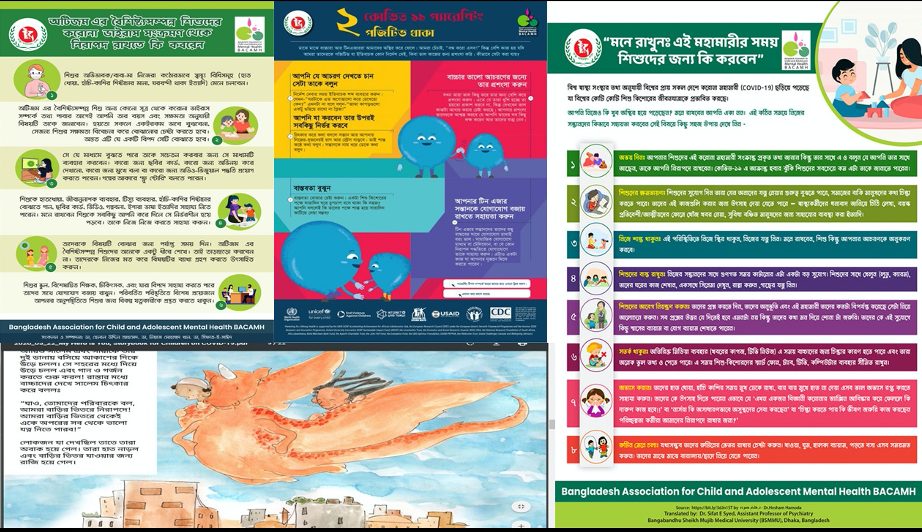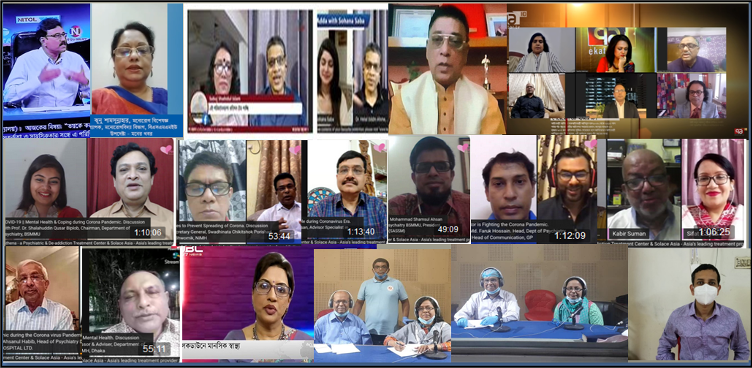Online CAP Services in Bangladesh During COVID-19 Pandemic
By Sifat E Syed, Assistant Profesor of Psychiatry, BSMMU. Dhaka, Bangladesh

Few translated materials on child mental health available in Government website
In Bangladesh, the first case of COVID-19 was identified on 8th March 2020; schools were closed from 17th March 2020, and the countrywide went to lockdown on 26th March 2020. To date, confirmed cases are more than 66000 and more than 900 confirmed deaths are due to COVID-19. Numbers are increasing rapidly after lockdown was partially lifted on June 1st.
This completely new situation in Bangladesh is taking a high toll on the mental health of the population. Particularly, children and adolescents are having a difficult time. They are homebound, with schools closed and exams postponed for an indefinite period. Children cannot go to play, cannot talk to their friends and cannot find the answer when it will end. The anxiety and stress among the parents have been transmitted to their children, which is making it worse.
During this pandemic, child psychiatric services in Bangladesh have been mostly online. In my institution (BSMMU), there is a virtual Out Patient Department where we sit in front of a computer; our patients call and get service for free. The National Institute of Mental Health (NIMH) are providing both online and offline services. Different organizations, like the Bangladesh Association of Psychiatrists (BAP) and the Bangladesh Association for Child and Adolescent Mental Health (BACAMH), came up with a list of Psychiatrists who are giving free telemedicine services for children and adolescents. The Ministry of Women and Children Affairs, the Department of Psychology from University of Dhaka and the Social Workers Association also opened their help lines for free service.
From these telemedicine help lines, psychiatrists are getting a lot of calls from parents regarding the psychological symptoms of their children. Children and adolescents are becoming sad, anxious, bored and sometimes angry. Younger children are becoming very clingy to their mothers. Most of the children are not following any routine at home, and they are spending a huge time watching TV, playing video games or using digital devices. Parents are struggling to manage children with neurodevelopmental disorders at home and are getting depressed. Some children with pre-existing psychiatric disorder are deteriorating. When parents are getting infected with COVID-19, they are going for isolation and their children cannot deal with the absence of their parents. Telemedicine services are providing explanation and assurance to parents, prescriptions for children, counseling for both parents and children alike, and overall guidelines on how they will survive this pandemic.
Awareness and advocacy activities are running simultaneously. Many templates and guidelines are created and made available in websites of Government and Non-government organizations. BACAMH have created some guidelines for parents and for children with special needs, and some other guidelines by WHO and IACAPAP have also been translated. In addition, UNICEF have translated a storybook on COVID-19 for children. The Directorate General of Health Services (DGHS) have adopted these materials, which are now available in their website.
Individual efforts from mental health experts are noticeable, with writing articles online, live webinars, and Facebook live posts that promote child mental health during COVID-19. Parents are joining these online sessions; they ask questions or express their own worries and get a live answer from a specialist.
Many private organizations, like BRAC, ICDDRB, Moner bondhu, and Bot Tola have taken online initiatives supporting child mental health. Few online agencies, like Hello Doctor, Moner Daktar, Athena, Pulse healthcare, and Olwel have started online video consultation services by specialist doctors.
Few challenges are faced during online Child and Adolescent Psychiatric (CAP) services. It is difficult to understand the full context of a child through a camera and to do a complete assessment. Inability to do examinations and investigations makes it harder, and many children are referred to nearby hospitals. Our residents of MD-Child and Adolescent Psychiatry are taking online classes and exams, however seeing fewer patients will reduce their clinical skills.
Nevertheless, there are opportunities that need to be mentioned. As most of CAP services in Bangladesh were previously city based, many patients could not seek help due to physical distance or lack of transport. This has now changed, as many people have internet and smart phones and are getting used to video calls. There are new trends in research too. Individuals and different organizations are doing online surveys, focusing on CAMHS and getting a rapid answer from respondents.
During this pandemic, everyone is afraid to go out to seek health services due to the fear of getting infected. The online Child and Adolescent Psychiatry service in Bangladesh has created an opportunity for parents to get the service from their home. Though it has some limitations, efforts of mental health professionals are hugely appreciated by general people and authorities.

Psychiatrists of Bangladesh in Television, Facebook and Radio talking about mental health during COVID-19

